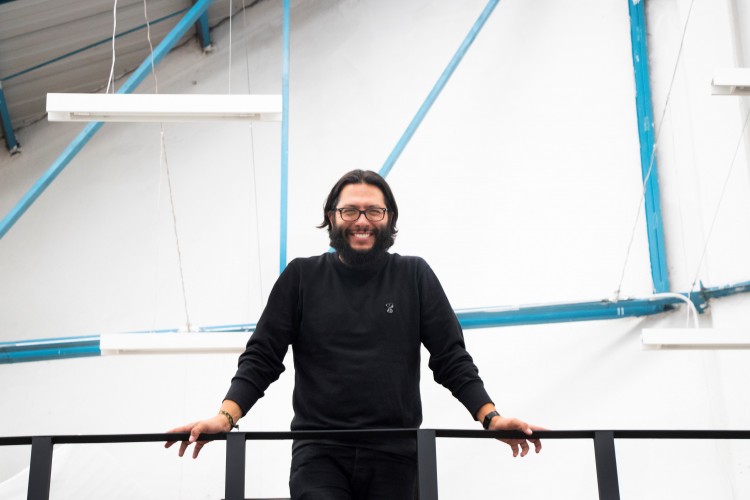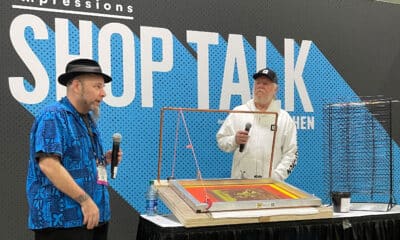Andy MacDougall
Come Together: Ahmed Bautista Discusses the Pandemic’s Impact on Mexico
‘This will be a time full of amazing art, for sure.’
Published
4 years agoon

For the past four years, I’ve attended a music festival in Mexico City called Corona Capital Festival at the invitation of my friend Ahmed Bautista, who runs Mercadorama (mercadorama.com.mx), a co-operative of artists and artisans that make merchandise for the music industry. Afiche Fetiche – “Poster Fetish” was an international exhibition of rock poster art he established in partnership with the festival in order to promote the art to a wider Mexican audience. I remember distinctly his original invitation to our group of international exhibitors: “You probably won’t make much money, but you will have a great time.” Turns out he was right about the second part; we had an amazing experience, hosted and assisted by his crew. And although we didn’t get rich, we got by. Every year it got better and the crowds kept returning. Last fall, he also arranged a museum exhibition on the history of screen printing and rock posters featuring 25 years of the Ames Bros from the US, and 10 years of Mercadorama. I ended up live printing in the Museum Modo as well as the festival.
The COVID-19 crisis has decimated the live music industry, and with it, companies like Mercadorama, all around the world. All the products they created, all the festivals and tours they had booked for 2020, all the bands who had ordered shirts, hats, tour jackets, posters. A lot of screen printing. In a few short months, doesn’t matter what country you live in, that business is now all gone. I reached out to Ahmed to gain his thoughts.
What were the first reactions to COVID-19 in Mexico?
Like everything that seems to happen in the rest of the world, COVID-19 came really late to Mexico. Even though it was on TV, the newspapers, and social media for weeks, our government (and population) only started paying attention many days after the lockdown was already in motion in Spain, Italy, and some other western countries.
At the same time, for those like us who create merch and art in the music and events industry, the news about possible festival cancelations started arriving in February. We knew it was coming, we just didn’t know how soon, or for how long, or how bad it could be. What we know now is that along with tourism, our industry is one of those that will be badly affected by it. Not only will the massive festivals take a long time to happen again, but it will also be slow, just a few at a time. The economic recovery of our businesses will take a lot longer than we would have wanted.
You say there was a delay in reaction time to the pandemic. Can you explain?
AdvertisementIn Mexico, things are a little bit more complex than the US or Europe. We live in a country where corruption and social inequity has been normalized. Hundreds of years of inequity will make this pandemic hit us worse than many other countries.
Salvador Dalí used to say, “Mexico is a surreal country… way more surreal than any of my paintings.” On one hand, we have a country where more than 60 percent live (or try to live) in extreme poverty, and every day they earn just enough to keep on living one more day. It is almost impossible to convince all of them to stay at home until this crisis passes, as they must work to make it to the next day.
On the other hand, we have a small percentage of the people who live an extremely luxurious and privileged life that not only can stay home for as long as they want, but also use this situation as a good excuse to go on vacation (and show off) on social media. Those same people who a month or so ago went on a ski holiday to Vail brought the worst souvenir ever back to this country: the COVID-19 virus. It infected their house maid, driver, assistants, and all the people that work for them, who, in turn, passed the virus to the more vulnerable groups in our society. And to make it even worse, the people who got sick are the ones who can’t afford a private hospital. Sad, right?
Have things improved since the first wave of infections hit?
Mexico has been divided socially for decades thanks to politics, and since last year we’ve been more divided than ever. However, this crisis is pushing us as a society to come together, to organize, and look for the greater good. When the government was taking too long to make a public statement and provide instructions, we (the people) organized with each other and started a voluntary lock down. Maybe it is the constant memory of the earthquake of 1985 or the one in 2017 that reminds us that when we get together and organize we can recover quicker.
Finally, our government is doing it way better. Every night at 7 p.m. the Sub-Secretary of Health gives us a public statement with updates and instructions to follow so we can overcome this global crisis. The lockdown is voluntary so far, with no police enforcement involved. However, it is getting more difficult every day to try to get everybody to stay at home. The selfishness is starting to win the battle… sometimes.
AdvertisementHow are things at Mercadorama?
Workwise our horizon looks gray – almost black. There is no government aid or grants for small businesses like we hear about in other countries, and it is even worse for the creative industries. In Mercadorama, our high season is March to May. After that comes summer and most of the international bands go and play at the European Festivals. We typically travel to those festivals and try to earn a little bit of money selling gig posters.
Back in 2019, due to the socio-political environment in Mexico we had a terrible year for Mercadorama. We sold just a few things at festivals and our extra revenue stream at the European festivals was almost gone due to the peso losing worth against the dollar. Traveling to other countries became super expensive and the return of investment almost impossible. We were hoping that 2020 was going to be a good year: We had four tours confirmed (two of them included shows at venues with a 70,000 capacity) and two big international festivals where we operate the event merchandise sales plus the headliners‘ merch.
All of that got canceled and what was going to be our recovery has become our ruin, with the investment made in T-shirts, garments, and materials for shows that won’t happen anymore. Some of them are already printed with dates that are now obsolete, some of them without printing but with no chance to be returned to the supplier. All the cash flow has evaporated. You plan to invest it a month earlier than a show and get the return of the investment a couple of weeks after, but suddenly you get the news that nothing will happen, at least until November. Bankruptcy is knocking on our door.
That sounds rough. It also sounds like a universal problem. Do you see any opportunities?
The crisis fuels creativity in all of us. While we look for strategies to keep Mercadorama alive and to keep the 30 families and some graphic artists making a living thanks to merch, our peso keeps losing value against the dollar. That makes us a good quality supplier for the US market with super low prices. We’ve been manufacturing face masks for many bands in the US and their online stores. That has helped us a lot. Maybe the face mask is here to stay and it will be part of our daily lives and therefore part of the merch lines of the concerts to come? I hope.
AdvertisementEven better, I love to see how this COVID-19 is making the graphic artists, printers, and merch companies come together. We’ve been talking on WhatsApp, Facetime, Zoom, Google Hangouts, etc., trying to find new ways to show the audience our work and get them to buy online. We are using our social media more than ever and collaboration is the way. We know the solution is working together and learning how to use the technology for our benefit. We are finally having time for that.
What about you? Any time we were together it seemed like you had a million things going on all the time, 24 hours a day.
In my personal life, everything is fine. This is a contrasting time, a sweet and sour one. On one hand, you have all the time in the world to do all of that you always wanted to do, but you don’t have any energy to do anything. You have a huge availability of amazing content to watch or read that could teach you something, or distract you, or even feed your spirit, but your day is full of nonsense activities that make you lose time. Social pressure has gotten worse, making you feel you are worthless if you are not productive, if you don’t get ahead with all those projects you’ve been postponing for ages, but at the same time you spend all your time sharing memes to make the time go faster.
However, that high contrast has its advantages. In our industry, we spend a lot of time on airplanes and traveling. Far away from home, far away from our loved ones. Eating fast food, drinking beer, and sleeping just a few hours. In this lockdown, I am very grateful that I get to have time to be at home for so long. With my girlfriend and my dogs (and the new cat that just arrived). I am sleeping and eating in a better way. Maybe that is the lesson to learn. Maybe this fast life we were living was taking us towards self-destruction.
Sounds good. Any last thoughts?
I hope this time will change us for the better. Maybe it will make us better humans and show us that the normal life that we were living as human beings was not the ideal. As the meme that is being shared in social media says: “When this is all over, I don’t want to get back to normality, the ‘normality’ was the problem.” Indeed.
Situations like this bring out the best and the worst in people. We are witnessing which people are guided by selfishness, and who are guided by generosity. Dark side against bright side. Undoubtedly the creative industry is far away from the dark side and it is getting unified and stronger. That makes me happy.
Last, it brings to mind a phrase that has been in my head since I was a child: “Crisis creates the perfect place for creating the most relevant and transcendental works of art.”
This will be a time full of amazing art, for sure.
Reach out to Ahmed on social media at the handles below:
Instagram – Business, Personal
Other Articles in the “Come Together” Series
Come Together (original online article)
Come Together: Beppe Quaglia, Michel Caza, and Gemma Berenguer
- Come Together: A Series
- Come Together: Beppe Quaglia, Michel Caza, and Gemma Berenguer Talk Pandemic
- Come Together: 'Nick Danger' Shares His Experience Facing the Pandemic in China
- Come Together: Ahmed Bautista Discusses the Pandemic's Impact on Mexico
- Come Together: Iris Sautier, Luther Davis, and Tom Davenport Share Their Pandemic Strategies
- Come Together: Edward Cook on Managing Through COVID-19
- New Normal: Updates From The ‘Come Together’ COVID-19 Series
SPONSORED VIDEO
Let’s Talk About It
Creating a More Diverse and Inclusive Screen Printing Industry
LET’S TALK About It: Part 3 discusses how four screen printers have employed people with disabilities, why you should consider doing the same, the resources that are available, and more. Watch the live webinar, held August 16, moderated by Adrienne Palmer, editor-in-chief, Screen Printing magazine, with panelists Ali Banholzer, Amber Massey, Ryan Moor, and Jed Seifert. The multi-part series is hosted exclusively by ROQ.US and U.N.I.T.E Together. Let’s Talk About It: Part 1 focused on Black, female screen printers and can be watched here; Part 2 focused on the LGBTQ+ community and can be watched here.
You may like
Advertisement

Arcus Printers Barracuda Conveyor Flatbed Cutter

The Profit Impact of a Market Dominating Position

Inkcups Announces New CEO and Leadership Restructure
Advertisement
Subscribe

Bulletins
Get the most important news and business ideas from Screen Printing magazine's news bulletin.
Advertisement

















